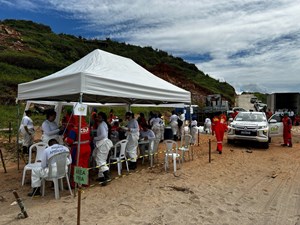Petrobras carries out oil spill simulations offshore Brazil to obtain Equatorial Margin drilling licenses
(WO) – Last week, Petrobras carried out an oil spill simulation Brazil’s Potiguar basin, in the offshore POT-M-762 exploration block, 85 km from Ponta Grossa Beach, in Icapuí, Ceará. The drill was carried out in compliance with a condition presented by Ibama as a step for obtaining a drilling license for the Pitu Oeste and Anhangá wells in the Potiguar basin.
The Potiguar Basin covers maritime portions of the states of Rio Grande do Norte and Ceará and is part of the so-called Brazilian Equatorial Margin, which extends between the states of Amapá and Rio Grande do Norte. The region is considered one of the world's newest and most promising frontiers in deep and ultra-deep waters.
Recent oil and gas discoveries announced in regions continuing to these borders, especially in neighboring Guyana and Suriname, indicate significant oil production potential for the Brazilian Equatorial Margin.
Brazil's new borders are essential to ensure national energy security and sovereignty, in a context of energy transition and low-carbon economy.
In total, about 440 people were mobilized during two days for the exercise, which took place in Fortim, Ceará, and Rio de Janeiro. Four aircrafts, two drones, two ambulances, 32 land vehicles, and 20 vessels were mobilized to simulate oil containment and collection, coastal protection, monitoring, rescue, and assistance to fauna.
In Fortim, an outpost was set up with a medical unit and two ambulances. In Rio de Janeiro, at the Senado Building, Petrobras' headquarters, in the center of the city, the teams were committed to meeting demands and articulating the necessary for the progress of operations.
Petrobras' Director of Exploration and Production, Joelson Falcão Mendes, stressed the importance of the exercise, saying, "Any drill that is part of our routine teaches us a lot so that we feel ready for possible real events. We are seeking licensing for a new frontier, an extremely important area for Petrobras and I am convinced that, with this competent work done here, Ibama will have more confidence that, in the event of a very small incident, we are prepared to act," said Joelson.
In the Equatorial Margin alone, there are four Environmental Defense Centers (CDAs), located in Pará, Maranhão, Ceará and Rio Grande do Norte; in addition to nine other CDAs, forward bases, and emergency response centers, distributed throughout the rest of Brazil.
All these structures are properly equipped for prompt response in the event of accidental events involving oil spills at sea, in order to minimize damage to the environment, even if the probability of an event of this nature occurring is very low.
The commander of the drill, Jeferson Kinzel, explained that Petrobras continuously improves its emergency response capacity, saying, "This drill represents a final stage of several years of work. Our EOR team worked very well orchestrated, showing that we are fully able to meet all demands related to the protection of the environment, fauna and coastal protection, as Petrobras is committed to. In an area of new frontier like this, showing efficiency, safety, and a huge mobilization of people, equipment, and resources opens up new perspectives for us to operate in the Equatorial Margin as a whole.”



